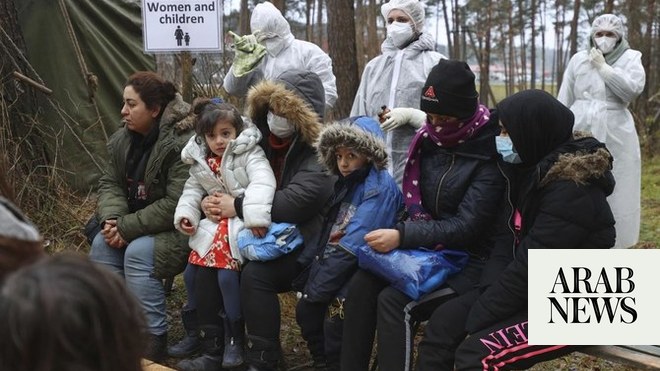
Human Rights Watch highlights alleged Polish illegal pushbacks of people to Belarus
Claims Belarusian guards committed extortion, violence, rape in makeshift camp
LONDON: Human Rights Watch has accused Poland and Belarus of “severe ill-treatment of migrants and asylum-seekers,” as hundreds of people from the Middle East and Central Asia attempt to cross into the EU via the Polish border.
The group claimed Poland frequently pushed people traveling from countries including Iraq, Syria, Iran, Yemen, and Afghanistan back across its border, sometimes violently, contravening the right to asylum and the EU’s Charter of Fundamental Rights.
As a result, migrants had been left stranded in Belarus where they faced “serious abuses, including beatings and rape by border guards and other security forces.”
HRW said it had spoken to nine people who had been trapped in the “inhospitable” border area, who documented how they had been treated.
While some said Polish border guards had provided them with food, water, and other vital products, interviewees recalled how they had been stranded, sometimes forced to wander through swampland, forests, and rivers, drinking what little water they could source when refused entry into Poland.
Other interviewees said they had been beaten with batons by the Poles. At least one person is known to have drowned after being pushed back by Polish border guards, and another went missing in the area in March 2022.
A Kurdish migrant, identified only as Ramzah, told HRW: “When the border guards came, we asked for asylum and showed them papers where we had written ‘asylum’ in Polish and English. They told us, ‘you don’t need those papers’ and threw them away.”
An asylum-seeker called Malid, fleeing from Iran, said: “We had walked in freezing cold and snow for seven to eight hours when Belarusian guards caught us, and we were wet, tired, and without energy. After forcing us to pay money, they took us to the Polish border and made us go through.
“We walked about two or three kilometers in Poland before we got arrested. They destroyed our phones, and they took my bank card … I asked them to show us respect and because I did, I was kicked, punched, tasered, and pepper sprayed.”
HRW also spoke to Polish border guards who confirmed that they frequently pushed people back across the border into Belarus.
The actions of Belarusian border guards, meanwhile, were significantly worse. Belarus constructed a makeshift camp at Bruzgi to house 4,000 people in November 2021, which has since been dismantled, and it was so basic that people had no heat or electricity, were forced to sleep on wooden pallets, and were fed only biscuits, once a day, by the authorities.
Stories of abuse against migrants were common, including extortion, violence, and rape.
One refugee called Abdullah, told HRW: “They (the Belarusian guards) forced us to stand in knee-high water for approximately 40 to 60 minutes while they ridiculed us. It was freezing cold, snow everywhere. Then they told us to cross the river. We had no option. They told us, ‘go or we shoot you.’
“My friend drowned in the river as he couldn’t swim. Another was swept down the river and disappeared, and two of us made it across but were later pushed back.”
Another, named Rekan, claimed the Belarusians had set dogs on him.
“One time we were surrounded by border guards, and I sat down screaming and the dog bit me. The guards were just laughing. I couldn’t run. Another time, I woke up in my sleeping bag feeling pain in my foot and saw how the dog was biting my toes. I screamed and pleaded with the guards to remove the dog.”
The interviewee named Ramzah also said sexual assaults were commonplace in Bruzgi.
“When it was the women’s turn to shower, the border guards and police went inside to watch them. I saw that once, but I don’t know if anything else inside the tent happened to the women and girls,” he added.
Polish human rights lawyer, Ola Chrzanowska, told HRW that one of her clients, a 35-year-old female Iraqi refugee who fled across the border with her 16-year-old daughter, had been raped by Belarusian border guards in front of her daughter at a facility by the camp.
Lydia Gall, senior Europe and Central Asia researcher at HRW, said: “It’s unacceptable that an EU country is forcing people, many fleeing war and oppression, back into what can only be described as hellish conditions in Belarus.
“To prevent further deaths, abuse, and suffering, Polish authorities should immediately stop pushbacks to Belarus,” she added.












